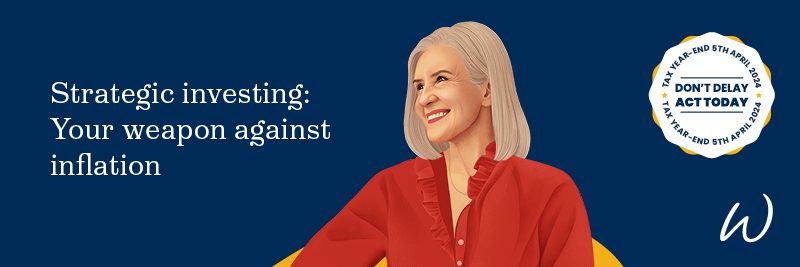Strategic investing: Your weapon against inflation
A balanced portfolio of investments can help you combat the long-term impact of fluctuating inflation and interest rates.

Overview:
- A higher-than-average inflation rate can chip away at the purchasing power of your savings.
- A diversified investment portfolio can help shield your money from the effects of inflation.
- Over time, equity investments such as stocks and shares tend to outshine the average rate of inflation, providing greater returns – although this may not always be the case.
Inflation remains a hot topic, despite the inflation rate having reduced significantly from 10.5% in December 2022 to 4% in December 2023 (as measured by the Consumer Prices Index (CPI)).1 Consumers have welcomed the news – yet, high prices persist, prompting most families to maintain a tight grip on household spending.
In our latest article, we provide an update on inflation as well as answering some key questions.
Keeping pace with inflation
The volatility in interest and inflation rates over the past two years can have a very real effect on the spending power of your savings and investments, along with your everyday household expenses.
With inflation on the rise, everything costs a bit more. The knock-on effect is that if your savings aren’t earning interest at a rate that outpaces inflation, they won’t stretch as far in the future.
This was the case for much of 2023. Cash savings or cash ISAs simply couldn’t achieve the necessary growth to match the ballooning cost of living. By June 2023, food prices were up by 17.3%.2
While the current inflation rate sits at a more manageable 4%, it’s still double the government’s 2% target. According to the Bank of England, it remains difficult to predict how interest rates will respond.3 It foresees interest rates remaining at 5.25% until autumn 2024, gradually dipping to 4.25% by the end of 2026.
Three commonly asked questions about inflation and investments
Q. What does inflation mean for my cash savings or investments?
A. It’s a wise idea to check your current interest rates on any Cash ISAs or savings accounts to see how they measure up against inflation, whenever new monthly figures are released.
And, while high interest rates are music to savers’ ears, remember to be savvy about not exceeding your personal savings allowance: £1,000 for basic rate taxpayers and £500 for higher rate taxpayers or the starting rate for savings, should you qualify for it. There’s no personal savings allowance for additional rate tax payers.
Q. If inflation rates rise again, will a bank account protect my savings?
A. In the quest to outsmart inflation, depending solely on savings from your local bank might not be the most effective approach.
Although banks provide interest on instant access savings and Cash ISAs, the standard rates offered by mainstream banks often fail to surpass, or even match, the inflation rate. As we’ve seen, this means that the purchasing power of your savings slowly declines.
If there’s a gap between the Consumer Price Index or inflation rate and the base interest rate, it’s quite hard to find savings providers that will offer returns above the rate of inflation.
Q. How can long-term investing help you beat inflation?
A. If your goal involves long-term savings, considering investment options could provide a more effective shield against inflation.
The key to beating inflation lies in investing in assets that yield a higher rate of return than typical interest rates. Equities, such as stocks and shares, tend to demonstrate this potential over the long haul.
You should be aware, however, that investing does come with a certain degree of risk. An adviser will always discuss what level of risk you feel comfortable with and help you choose a diverse portfolio that’s appropriate for you – and your long-term financial goals.
Don’t put all your eggs in one basket
A well-balanced investment portfolio is your ticket to weathering the storms of fluctuating inflation and interest rates. Spreading your investments across different types of assets – such as equities, bonds or property – is also a good way to strengthen your portfolio.
Diversification is a wise strategy as different assets may perform differently under different economic conditions. No single type of asset will be the best-performing one forever. So, by keeping a diversified portfolio, you can help make your investments more resilient – whatever inflation and interest rates are doing.
Speak to your adviser before the end of the tax year to discuss your options.
The value of an investment with St. James’s Place will be directly linked to the performance of the funds you select, and the value can therefore go down as well as up. You may get back less than you invested.
Equities do not provide the security of capital which is characteristic of a deposit with a bank or building society.
The levels and bases of taxation, and reliefs from taxation, can change at any time. The value of any tax relief is generally dependent on individual circumstances.
Sources
1Office for National Statistics – 17th January 2024
2Food Foundation Food Prices tracker – 18th July 2023
3Bank of England – 2nd November 2023
